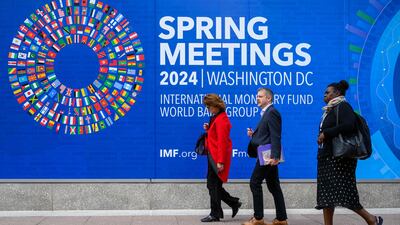Finance ministers and central bankers from around the world are set to descend on Washington for the International Monetary Fund and World Bank 2024 Spring Meetings this week as Middle East tensions, weak productivity and debt distress cast uncertainty over the global economic outlook.
Previewing the focus of this year's events, IMF Managing Director Kristalina Georgieva said the world faces a disappointing stretch unless leaders address policies that invigorate growth. Unless such action is taken, Ms Georgieva said this decade could be remembered as the “Tepid Twenties”.
Here is what to look out for during this year's IMF and World Bank Spring Meetings:
An uncertain economic outlook
While the world is expected to see a “marginally stronger” economic outlook in 2024, Ms Georgieva said it will still be historically weak amid declining productivity, rising debt levels and a depletion of fiscal buffers.
Ms Georgieva said the body's medium-term outlook is expected to sit slightly above 3 per cent. The multilateral lender will release its latest world economic outlook report on Tuesday.
In her remarks, Ms Georgieva noted the difficulty of adhering to fiscal prudence.
“This is especially true in a year with a record number of elections and at a time of high anxiety due to exceptional uncertainty and years of shocks,” Ms Georgieva said last week.
Heightening the uncertainty is the Israel-Gaza war, which faced a moment of serious escalation when Iran launched hundreds of drones and missiles against Israel at the weekend.
Conflicts in the Middle East and North Africa caused the fund in January to downwardly revise its growth forecasts in the region to 2.9 per cent this year, half a percentage point below its October 2023 report.
The IMF will release its updated economic outlook for the Mena region on Thursday.
An uneven path to economic recovery
Debt levels among low-income countries have soared since the central banks raised interest rates in response to rising inflation, and the US is expected to push for its vision to address global debt.
Treasury Secretary Janet Yellen recently concluded a trip to China, where she and her Beijing counterparts held talks on how the two countries can collaborate on problems such as debt distress.
Jay Shambaugh, US undersecretary for international affairs, warned ahead of the Spring Meetings that the world faces a “generational challenge” of developing nations burdened with debt.
Mr Shambaugh said programmes should put countries on a path to “unleash private flows”, citing the recent $8 billion loan package the IMF had granted Egypt.

“Sovereign debt distress in low-income countries is a global challenge. We need to be able to work together on it,” he said at the Peterson Institute last week.
The IMF, World Bank, bilateral and private creditors, as well as borrowing countries, are due to meet for talks during the global sovereign debt round-table on Wednesday.
A cautious eye on monetary policy
The battle against inflation has not yet been won, Ms Georgieva said, warning central banks to be careful in determining their next steps.
The US fight against inflation appears to have stalled, leading markets to downwardly revise their number of rate cuts this year. The financial press will be tuned into Federal Reserve Chair Jerome Powell's fireside remarks on Tuesday for potential clues on near-term policy.
With recent data showing the Federal Reserve Board is unlikely to raise rates soon, it opens the door for the European Central Bank to be the first of advanced economies to dial back on policy.

“I have said in the past that we are data dependent, we are not Fed dependent,” Ms Lagarde said, after leaving interest rates unchanged last week.
Ms Lagarde and other central bankers are navigating the dual risks in their latest chapters of fighting inflation. Dialling back on rates too soon could stall their inflation fight, but holding too long could lead to mass unemployment and a potential recession.
A better World Bank on display?
World Bank President Ajay Banga wants to put a stronger and more efficient organisation on display this week, about a year after he was confirmed as the body's leader.
Mr Banga highlighted several reforms the World Bank has recently made including accelerating its approval process. It has also expanded its reach of eliminating poverty by addressing other global issues like climate change and pandemics.
The World Bank faced calls to reform over its handling of the Covid-19 pandemic, which resulted in dozens of countries being laden with debt.


